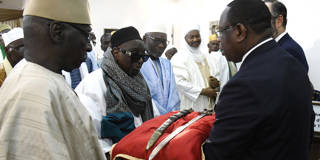
Why African Cultural Restitution Matters
Until very recently, European cultural institutions preferred to act as if colonialism had not rested on the violent disavowal of African art, music, and architecture. But that is finally starting to change, owing not least to the efforts of young Africans.
NEW YORK – French Prime Minister Édouard Philippe recently presented an antique saber to Senegalese President Macky Sall at the presidential palace in Dakar. But it was not a gift. The saber was coming home, more than a century after it had been stolen.